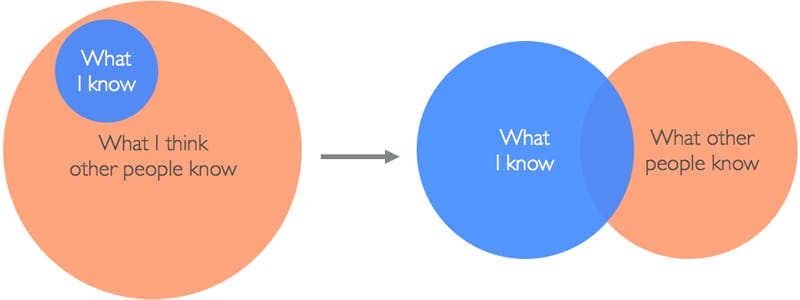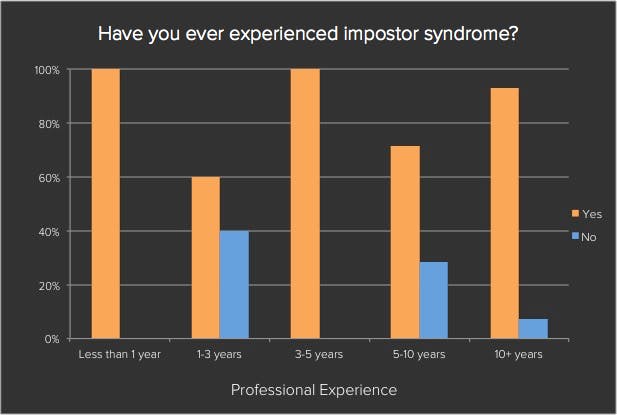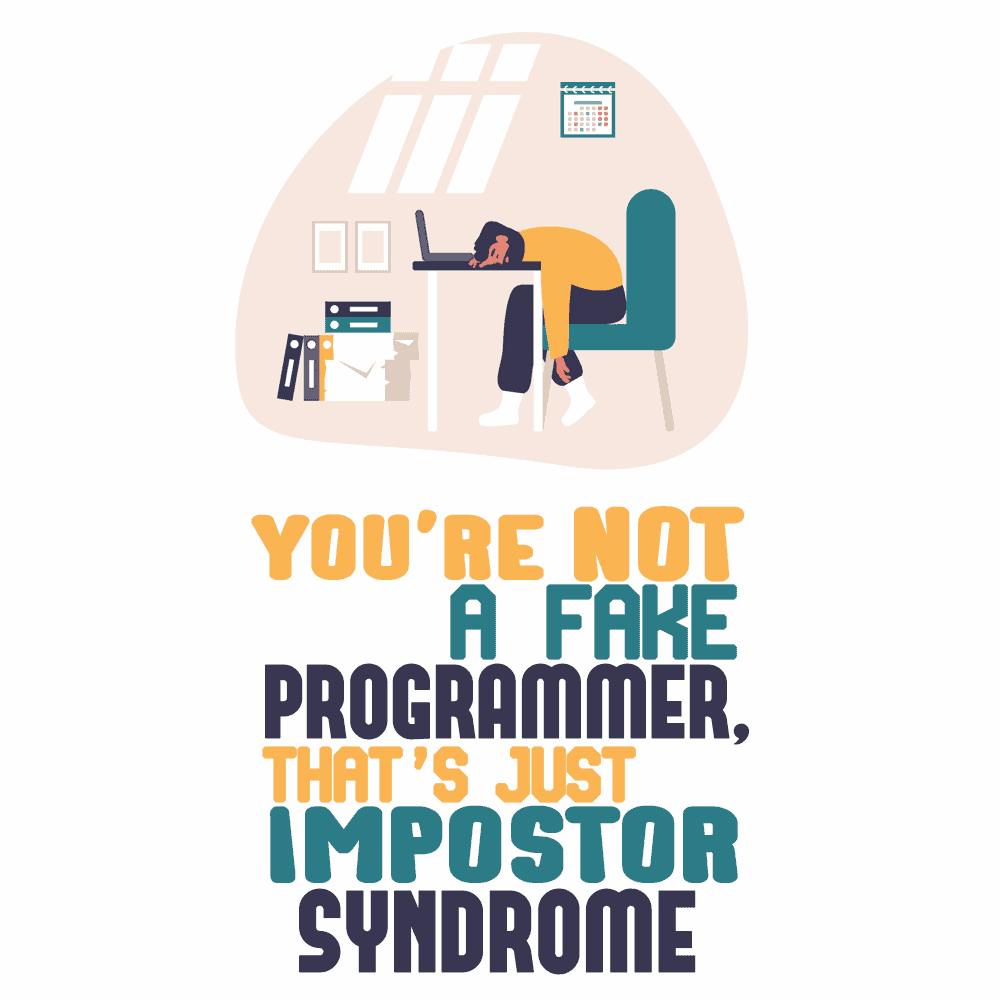Hello, buddies! This is a somewhat different topic you know but it is useful for developers. The reason for writing this is in one of comments in this article. So buddies, What is Developer imposter syndrome?
Think you’re unqualified for the work you do? It’s called imposter syndrome.
 source - Thinkful.com
source - Thinkful.com
Do you beat yourself up for making simple mistakes? Or maybe you get completely lost in a meeting about a new project because you don’t know half the technologies the other devs are talking about. And to make matters worse, you constantly feel like you’re falling farther and farther behind the next, hot framework or language.
Welcome to software development! Enjoy your stay!
Kidding aside, these negative emotions are very common (you’re not alone!). It’s called imposter syndrome: the constant feeling of not being good enough or knowing enough to do your job well. Everyone has experienced these emotions at some point in their life, whether personal or professional—and not just within software development. It’s human nature. The most successful and productive people are often very effective at minimizing the occurrences of imposter syndrome in their lives.

Managing developer impostor syndrome
One of the biggest problems with developer impostor syndrome is the fact that it never really goes away. For programmers that do manage to overcome it, advancements in technology can easily cause the experience to reoccur.
So, it’s important to find methods that help you manage the times that you feel like an impostor on the dev floor. There are three main tactics to help you manage developer impostor syndrome, and three things to remember when you feel like a fake.
How to take charge of developer imposter syndrome
Here are few tips to fight with developer imposter syndrome
1. Get comfortable with being uncomfortable
You need to realize and accept that imposter syndrome never truly goes away. The crux of imposter syndrome is that you’re comparing what you know to what you think other people know. You don’t see other people struggling and you don’t know what they don’t know. It’s like perusing Facebook or Instagram: you see everyone else’s vacations, new cars, new homes, new phones, new significant others, etc. But you’ll sparingly see their doubts and low points on a frequent basis. You’re comparing an ideal view of Facebook life to your whole life, both the good and bad parts.
This is the essence of imposter syndrome. You see everyone else’s success and intelligence, and then you fear that you don’t have that or know that concept or technology. The focus on your own weaknesses is understandable and natural. None of us want to be the worst developer in a company. Most developers love to learn and there’s so much to learn in development. So it’s natural to look at what you still have yet to learn, compare yourself to people who already know all of it, and feel inferior and that you’ll never be an expert.
To be honest, you never really will be an expert in software development. It is always updating and There will always be more to learn. There will always be new languages, or processes, or technologies to learn. There will always be someone who knows something you don’t. There will always be someone who knows more than you do. There will always be someone who’s a better developer.
2. Adopt the growth mindset
People with the fixed mindset have a constant need to prove their competence and intelligence. They have a deep need to be perfect at everything and to be perfect immediately. Because these people view their intelligence as fixed, failures are a reflection of their lack of intelligence and so they seek to blame circumstances or other people for their failures.
In her book though, Dweck shows that intelligence is not fixed, and in fact, it is directly tied to effort and challenge. The mindset of viewing obstacles as opportunities to learn, to help you improve instead of assaults on your intelligence is Dweck’s “growth mindset”.
Essentially, your feeling of inadequacy is a signal that you’re being challenged. To really become a great developer, you need to embrace that challenge and actually seek it out. View it as an opportunity to learn, to become better, and to grow.
Keep track of your accomplishments
*Regularly reflecting on your successes can help remind you of how far you’ve come and how good you really are. This will help balance the scales of positive vs negative self-talk that is at the heart of imposter syndrome.
One good way to do that is to make a recurring calendar appointment for the end of every month to add all accomplishments from that month to a “portfolio” of accomplishments. Even if something eventually failed, if you attempted something outside your comfort zone, write it down. It was a growth experience.
In addition to capturing your monthly accomplishments, you should also take a few minutes to reflect on past accomplishments and add any to previous months that you forgot. Also, don’t just write them down and read them. You need to truly reflect on what went into that accomplishment and how you felt about it.
This practice comes with a bonus too. You can take that portfolio to boost your résumé or LinkedIn profile to help you get future jobs. Yea we all know that. Woot!
4. Find out how your manager thinks you’re doing
Imposter syndrome thrives when all you do is think. One of the things you need to do is get out of your own head to combat imposter syndrome. Your manager is the person who has control over your job and getting their input on how you’re doing is essential for getting a realistic view of your skills and effectiveness.
Ideally, you’ll be meeting with your manager in one-on-ones on a regular basis anyway, but if not, talk to them about setting it up. In these meetings I suggest that you discuss the following:
What do they feel you’re doing well? Make sure you keep doing this. Is there anything specific they feel you need to work on in the short-term? If so, what measurable goals can you both set to determine success? What longer-term (3-6 months), measurable goals can you both set that will indicate success to your manager? This is useful when you’re just starting with a new company or on a new team to calibrate your progress expectations to theirs’. Once you have some goals, discuss your progress with your manager at your regular meetings. Things change and so should goals, so don’t be afraid to refine or change goals as circumstances change.
5. Figure out how you learn the best
While there is now data showing that learning styles aren’t really a thing, everyone has ways that they prefer to learn. Using your preferred learning style can help instill confidence and push you further away from your imposter syndrome. Think back on what you’ve tried to learn in the past and what worked best. Think about which resources (books, videos, courses) seemed to make things clearer or what seemed to help you get to that “Ah ha!” moment.
I know a lot of game developers that learnt best by doing. I’m the same way. Only by seeing how it works in practice can I fully understand it. This learning method means using projects in books, courses, or that you make up, to drive your learning. If you can create a project that you’re personally very interested in, that desire can help you to power through the roadblocks and challenges you’ll run into.
Use this self-knowledge and experiment with alternatives to improve your learning going forward. As you refine your process you’ll speed up your learning and decrease the amount of that time you feel stuck and incompetent.
You’re a developer
Suffering from developer impostor syndrome can be debilitating, but it can help to remember that you’re not alone. It’s completely normal, and more widespread than you might realize.
Developers are in a role where they’re always learning because it’s impossible to know everything all the time. So, if you are willing to adapt and learn new skills, tech and languages as you need them, then you aren’t a fake. You’re a developer.

Make sure you've read this post,
